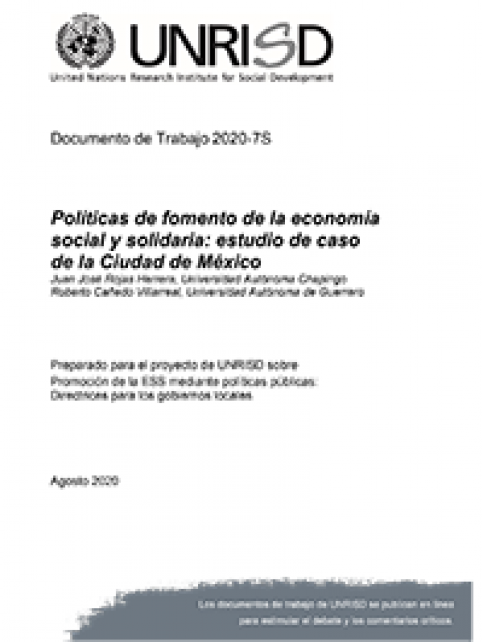Policies to promote the Social and Solidarity Economy: Case study of Mexico City

Summary
This report aims to deepen the understanding of the design and implementation processes of public policies to promote the Social and Solidarity economy (SSE) in Mexico City (CDMX) during the period 2016-2019, as well as to propose general guidelines which can contribute to its improvement and improvement. This research was conducted in three phases: documentary review of printed materials, field research and preparation of the report.
Among the main findings, important points to be highlighted: (a) there is policy for the SSE promotion, fundamentally, by legal and institutional inertia and by the pressure of social demands to combat unemployment; (b) the government body in charge of executing the provisions according to the Law on Social and Solidarity Economy (LESS), the Secretariat of Labor and Employment Promotion (STyFE) of the Mexico City Government, due to its serious budgetary and qualified personnel deficiencies, only serves the cooperative sector, not the whole range of associations and entities recognized as an integral part of the so-called social sector of the economy; (c) the current legal framework, at substantial level, is not fulfilled nor reaching its perfection level; (d) between 2015 and 2018, modest results were observed, which seem to be affected by unclear management (by officials and beneficiaries) of the resources and programs to support the SSE; (e) in 2019, within the framework of the so-called “republican austerity”, a strong administrative centralization of the programs was introduced, accompanied by massive layoffs of employees and instructors; lack of experience of the new authorities and the fictitious constitution of new cooperatives; and (f) throughout the research period, it was known the inability of government efforts to guide and channel the transformative and innovative potential of the SSE.
Recommendations: (a) align immediately the legislation applicable to the SSE enterprises with the Local Constitution and comprehensive reform of the Federal District Cooperative Development Law (LFCDF); (b) prepare a reliable and updated directory of cooperatives; (c) simplify and make flexible and transparent all administrative processes; (d) establish a geo-referencing procedure for each cooperative that keeps its status updated in real time; (e) develop multi-year programs to achieve long-term goals; (f) stop intergroup struggles in the management of institutional spaces; (g) coordinate the public entities involved in the implementation of the public policies: Mexico City Government(GCDMX) and the Municipalities; (h) reduce the quantitative goals, with respect to what was established in 2019, favoring the qualitative aspects (training and technical support for cooperatives) and not the quantitative ones (number of cooperatives formed or strengthened); (i) adopt a homogeneous training methodology for the capacity building and strengthening of cooperatives; (j) evaluate the programs by external institutions to the GCDMX on a permanent basis; (k) recover the Consultative Council for Cooperative Development of the Federal District (CCFCDF) as an institutional space for dialogues and decision-makings with the cooperative movement; (l) encourage research and diagnostics on the conditions in which cooperatives operate and consider, based on evidence derived from this research, the possibility of extending public policies beyond the cooperative sector.
Paper authors
Juan José Rojas Herrera, Chapingo Autonomous University
Roberto Cañedo Villarreal, Guerrero Autonomous University